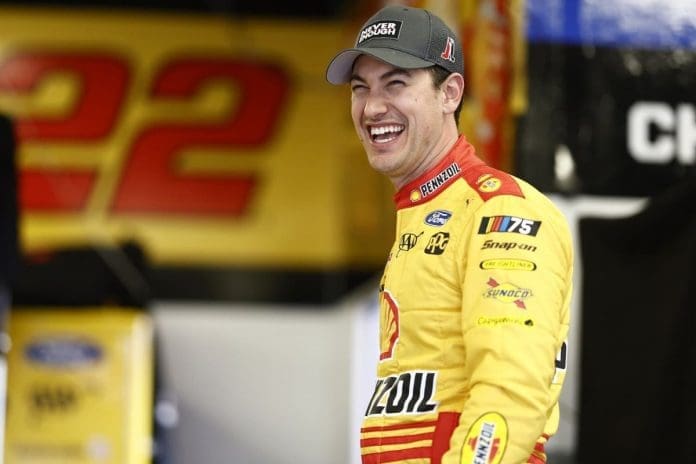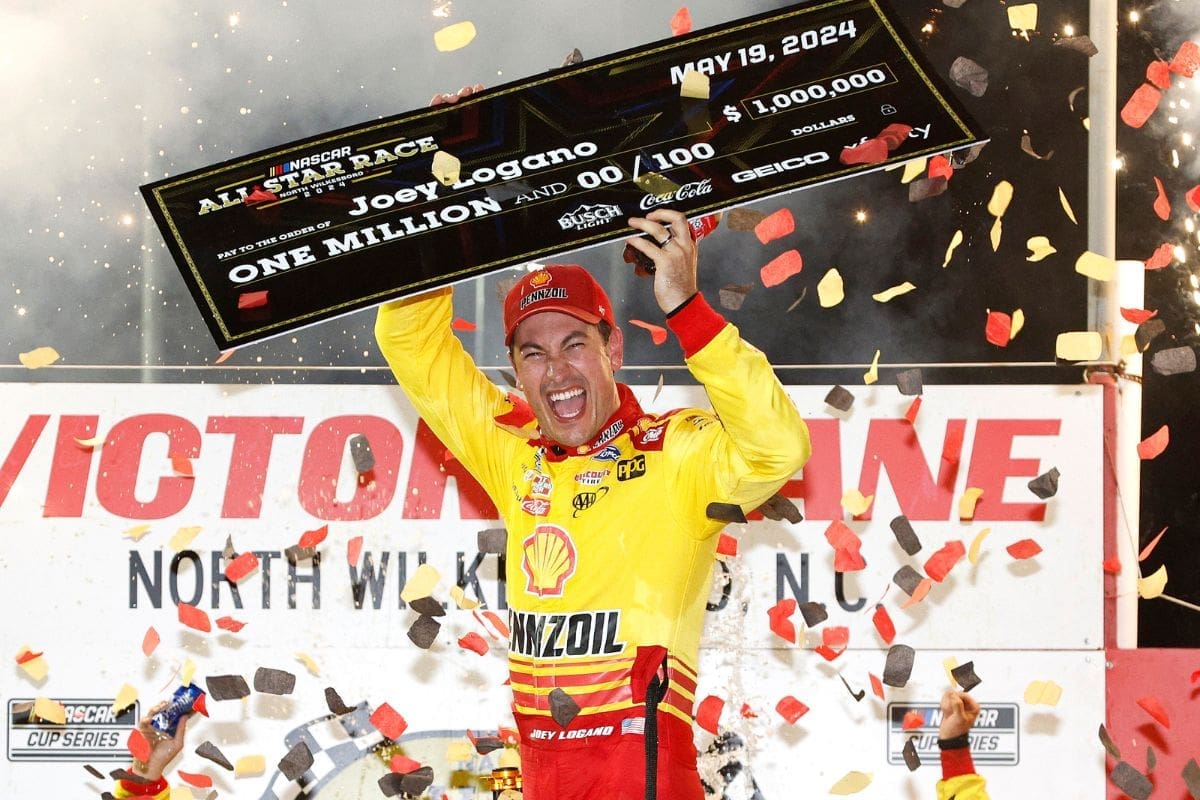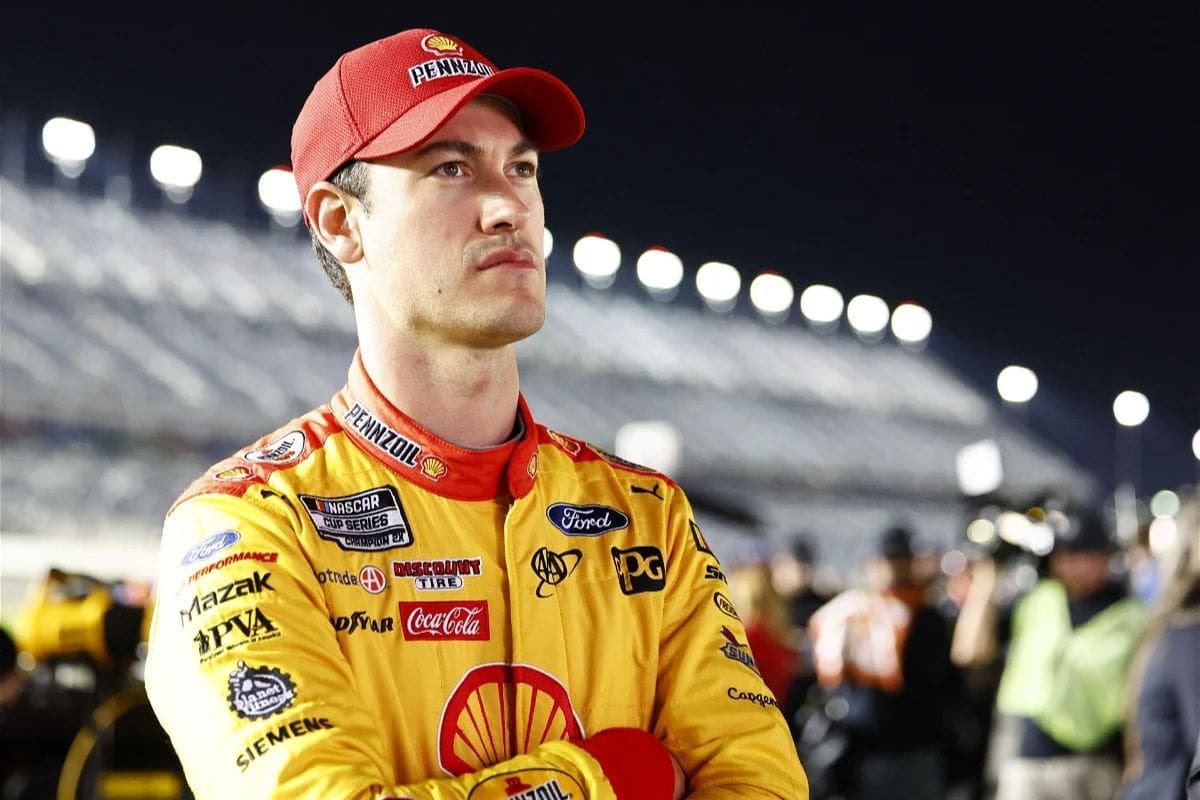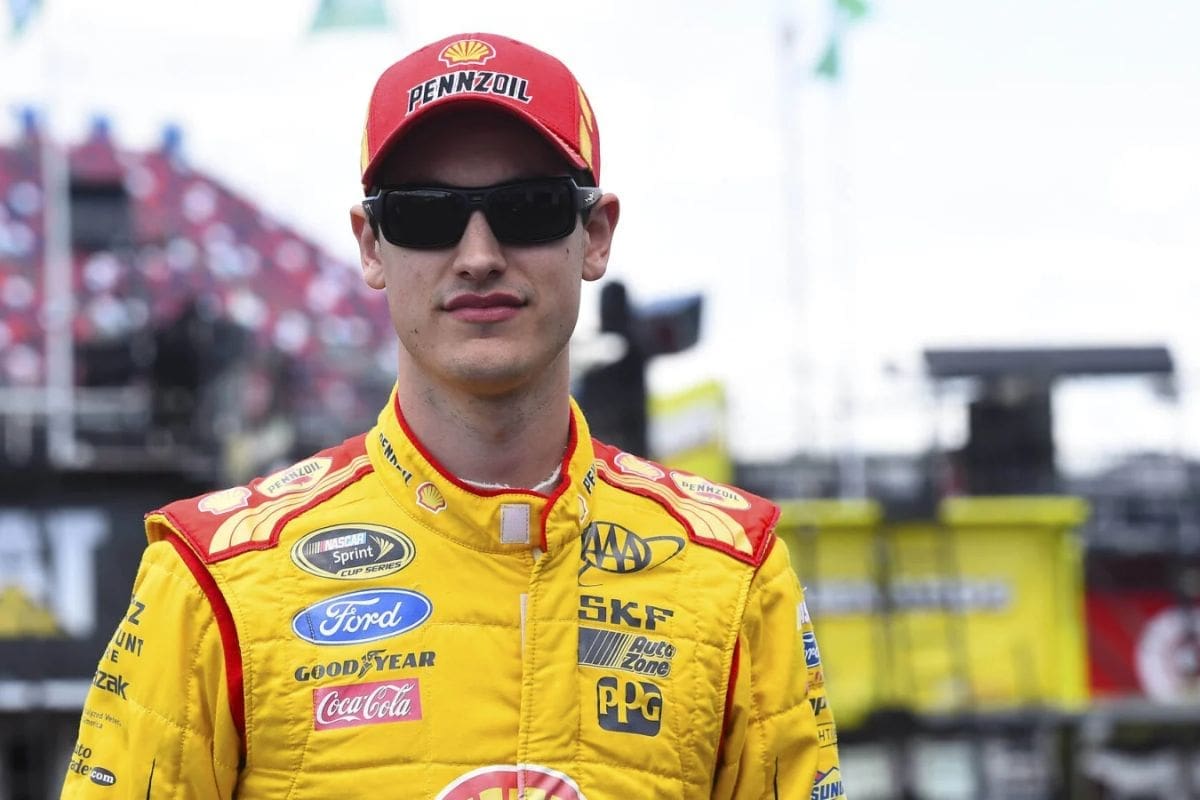Joey Logano Slams NASCAR’s 1 Million Dollar Prize: Joey Logano‘s critique of NASCAR’s $1 million prize as insufficient has sparked a significant debate about the alignment of prize money with current economic conditions. Logano’s assertion that the prize, unchanged since 1985, fails to account for inflation, brings to light broader financial challenges faced by racing teams today. As operational costs escalate, Logano’s call for a recalibration of monetary rewards raises questions about the sustainability of competitive integrity in the sport. This situation invites a closer examination of how NASCAR’s prize structures might need to evolve to maintain fairness and support for all participating teams.
Key Highlights
- Joey Logano criticized the $1 million NASCAR All-Star prize, calling it outdated due to inflation.
- Logano highlighted that the $1 million prize from 1985 has lost value in today’s economy.
- He called for NASCAR to adjust prize money to reflect current inflation rates.
- The outdated prize money fails to match the financial demands and costs of modern motorsports.
- Logano’s comments suggest a need for a reassessment of financial incentives to maintain competitive fairness.
Joey Logano’s Victory and Prize Money
Joey Logano’s recent victory at North Wilkesboro Speedway, which secured him the sought-after $1 million prize in the NASCAR All-Star race, highlights both his fluctuating 2024 season performance and the event’s significant financial allure. The NASCAR All-Star race, renowned for its ‘Winner Takes it All’ format, stands out not for contributing to the season’s points tally, but for the substantial financial reward that accompanies a win. This year, Logano’s win in this event emphasizes the unique pressures and opportunities that define the competition.
Despite his status as the 2022 Cup Series champion, Logano’s 2024 season has been marked by inconsistency. Prior to his recent win, Logano had yet to secure a victory, facing several challenges in maintaining competitive race pace. His performance on May 19, however, demonstrated a remarkable turnaround. Logano delivered a decisive P1 finish, narrowly edging out Denny Hamlin by six-tenths of a tick, showcasing his resilience and strategic skill under pressure.
The $1 million prize not only serves as a significant motivator but also amplifies the prestige of winning the All-Star race. Logano’s victory, thus, is not only a reflection of his driving skill but also a demonstration of the race’s ability to attract top-tier talent and competition due to its lucrative reward. The financial stakes of the event play a pivotal role in its allure, drawing both drivers and viewers into the spectacle that defines the NASCAR All-Star race.
Logano’s Comments on Inflation and Prize Money
In an open post-race interview, Logano emphasized the need to adjust the prize money to reflect current inflation rates, proposing that the $1 million reward, set in 1985, should now be substantially higher. His comments, though delivered with a touch of humor, highlighted a critical issue facing the sport: the erosion of prize value over time due to inflation.
Logano pointed out that the economic landscape has changed considerably since the All-Star Race’s inception. ‘We should keep up with inflation,’ he remarked. ‘How many years ago did you start at a million bucks? 1985. Oh, my goodness. It should be three times the amount now.’
According to the US Bureau of Labor Statistics, $1 million in 1985 would be roughly equivalent to $2.5 million today. This stark difference emphasizes how the current prize is not as lucrative as it once was, potentially impacting team morale and financial strategies.
“Quite a bit. Quite a bit. A million reasons to make me smile today, that’s for sure,“.
“Maybe that’s one thing we should change is, you know, we should keep up with inflation. I mean, how much is it more now from when we started the All-Star Race? How many years ago did you start at a million bucks? 1985. Oh, my goodness. It should be three times the amount now.” – Logano
Logano’s observations extend beyond mere numbers. By bringing attention to the disparity caused by inflation, he is advocating for a more equitable reward system that acknowledges the increasing costs associated with competitive racing. His remarks suggest a broader conversation within the industry about how to maintain the sport’s financial viability and attractiveness.
Furthermore, Logano’s openness may resonate with other drivers and teams who feel similarly constrained by outdated financial rewards. As the costs of vehicles, technology, and logistics continue to rise, aligning prize money with inflation is not just a matter of fairness, but of sustaining the sport’s competitive edge.
Financial Realities in Motorsports
The financial realities of motorsports reveal a complex interplay between escalating costs and the need for updated prize structures to sustain competitiveness. Joey Logano’s recent critique of NASCAR’s $1 million prize highlights the financial strain teams endure in an industry where costs continue to rise. This dichotomy between the joy of victory and the financial challenges emphasizes a broader issue within the sport.
“Honestly, no matter what the check says, it feels great to win and just beat everybody. That’s what it’s all about.” – Logano
- Car Development and Maintenance: The continuous need for advanced technology and materials to maintain a competitive edge drives up expenses.
- Team Salaries and Logistics: Paying skilled personnel and managing the logistics of travel and race day operations are significant financial outlays.
- Sponsorship and Marketing: Securing and maintaining sponsorship deals require strategic investments, often demanding more than what prize money alone can cover.
Logano’s comments bring to light the inadequacy of current prize structures in addressing these burgeoning expenses. While a $1 million prize may seem substantial in isolation, it barely scratches the surface of the financial requirements to field a competitive team. This difference highlights the necessity for NASCAR and other motorsport organizations to reassess their financial models.
Impact on Non-Charter Teams
Marginalizingnon-charter teams through the introduction of the charter system in 2016 has greatly worsened their financial challenges, undermining their competitiveness and sustainability in the sport. The $7.7 billion media rights deal, a cornerstone of NASCAR’s revenue stream, fails to allocate any funds to non-charter teams, creating a stark financial disparity. This exclusion has placed non-charter teams at a severe disadvantage, making it increasingly difficult for them to remain financially solvent and competitive.
Before the implementation of the charter system, non-charter teams were viable contenders, capable of competing for championships and finishing within the top five. However, the landscape has dramatically shifted. The charter system inherently prioritizes chartered teams, granting them guaranteed entry into races and a more significant share of revenue. Consequently, non-charter teams struggle to secure sponsorships and investments, which are critical for their survival and growth. This has led to a decline in their performance and visibility on the track.
The return on investment for non-charter teams is at an all-time low, as they grapple with escalating costs and diminished revenue opportunities. The structural inequities have created a vicious cycle where non-charter teams are unable to invest in the necessary resources to improve their performance, further diminishing their appeal to sponsors. This financial marginalization not only threatens the existence of non-charter teams but also reduces the competitive diversity within NASCAR.
Challenges for Big-Named Chartered Teams
While non-charter teams face significant financial hurdles, even established chartered teams like Hendrick Motorsports struggle to achieve profitability. Despite their storied history and numerous victories, the financial landscape for big-named chartered teams remains challenging. Jeff Gordon revealed a stark reality when he stated, ‘I don’t think Hendrick Motorsports has made a profit in 10 years.’ This disclosure highlights the broader financial challenges within NASCAR, impacting even the most successful teams.
“We don’t make money right. I don’t think Hendrick Motorsports has made a profit in 10 years. And then you say, ‘Why do you do it?’ Well, it’s because Rick Hendrick loves the sport, he loves the cars and it’s good branding.” – Gordon
The financial model currently in place demands that teams find alternative revenue streams to stay afloat. For Hendrick Motorsports, business-to-business (B2B) relationships have been pivotal. As Gordon noted, ‘If we didn’t have all the B2B… I don’t know where that would put us.’
“But if we didn’t have all the B2B, and we’re the few teams out there that are fortunate to be able to have B2B ties. The Hendrick Auto Group and Hendrick Motorsports together and bring these sponsors in, I don’t know where would that put us if we didn’t have that. It’s not just about Hendrick, and there’s a lot of teams struggling.” – Gordon
- High Operating Costs: Maintaining competitive performance requires significant investment in technology, talent, and infrastructure.
- Dependence on Sponsorships: Teams rely heavily on sponsorships and partnerships to cover expenses, making them vulnerable to market fluctuations.
- Charter System Costs: The high cost of acquiring and maintaining charters, exemplified by Spire Motorsports’ $40 million purchase, further strains financial resources.
Joe Gibbs acknowledged the benefits and drawbacks of the charter system. While it provides stability and a guaranteed revenue share, it also raises barriers for new entrants, limiting the competitive landscape. This situation highlights the need for a re-evaluation of NASCAR’s financial structure to maintain sustainability for all teams, big and small.
“The charter system has been a game-changer for our team. It offers a guaranteed starting spot and a share of the revenue, which has allowed us to plan long-term. However, I understand it makes it tougher for new teams to break into the sport.” – Gibbs
In this context, Joey Logano’s criticism of the $1 million prize money as ‘cheap’ seems to reflect a broader call for financial equity and sustainability in the sport. The current model, while offering some advantages, clearly necessitates reform to support the long-term viability of all participants.
News in Brief: Joey Logano Slams NASCAR’s 1 Million Dollar Prize
Joey Logano’s critique of NASCAR’s unchanged $1 million prize highlights the importance of addressing the misalignment between historic prize structures and current economic demands. His call for inflation-adjusted rewards emphasizes the financial challenges faced by teams, accentuating the need for a modernized prize system.
Tackling these disparities is vital for maintaining competitive integrity and sustainability within the sport. As a result, NASCAR must reevaluate its financial framework to guarantee fair compensation that reflects contemporary economic realities and supports the diverse needs of all participating teams.
Our Reader’s Queries
Q. How much money did Joey Logano make?
A. Joey Logano showcased an impressive performance at the short track of North Wilkesboro Speedway, leading for all but a solitary lap out of 200, clinching his second All-Star Race victory on Sunday evening. His triumph not only secured him the prestigious title but also netted him a substantial $1 million prize.
Q. Who won the million dollar NASCAR race?
A. Joey Logano’s masterful display of dominance and strategic prowess was nothing short of remarkable. Setting a new NASCAR All-Star Race record by leading an astonishing 199 out of 200 laps, Logano left contenders like Denny Hamlin and the ever-mobile Kyle Larson trailing behind on Sunday night. This stellar performance not only secured Logano the victory in the 40th edition of the event but also bagged him the coveted $1 million top prize.
ALSO READ: Joey Logano Emphasizes Teamwork After All-Star Pole Victory




